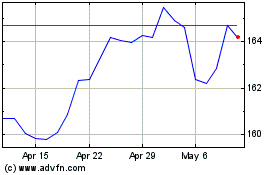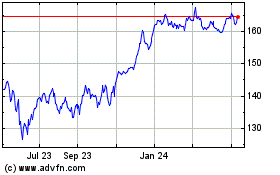T-Mobile-Sprint Deal Concern Mounts on Wall Street
January 15 2020 - 5:59AM
Dow Jones News
By Drew FitzGerald
Wall Street is growing more nervous about the fate of the
proposed merger of T-Mobile US Inc. and Sprint Corp., as lawyers
for the companies prepare to make final arguments Wednesday in
defense of their deal.
Shares of Sprint are trading at a more than 40% discount to the
value of T-Mobile's proposed all-stock deal, which is now worth
about $34 billion after steady gains in T-Mobile's market value. It
is the widest gap since the merger of the two cellular providers
was struck nearly two years ago.
The discount has doubled in recent months as the two companies
have tangled in court with a group of state antitrust officials led
by California and New York, a sign of growing doubts about the
deal.
"The market's getting more pessimistic," said Ric Prentiss, an
analyst at investment bank Raymond James. He said investors are
waking up to the risk that "if this deal doesn't go through,
Sprint's going to go down pretty hard."
Representatives for Sprint and T-Mobile declined to comment.
The states argue that combining the country's third- and
fourth-biggest cellphone carriers would hurt consumers. They have
maintained their opposition to the deal despite a series of
concessions that the Justice Department and the Federal
Communications Commission wrested from both companies last
year.
Officials from 13 states and the District of Columbia -- all
Democrats -- took the case to trial in December, forcing several
high-profile industry executives to testify about the transaction's
merits. U.S. Judge Victor Marrero is scheduled to hear both sides'
closing statements Wednesday morning in Manhattan. He could render
an opinion within weeks.
Sprint shares ended Tuesday at $4.86, and T-Mobile closed at
$79.80. Japan's SoftBank Group Corp. owns more than 80% of Sprint's
shares while Deutsche Telekom AG controls T-Mobile. Sprint's
relatively small number of shares floated on the open market has
deepened its latest stock swoon.
T-Mobile and Sprint have argued that joining forces would create
a stronger and more efficient competitor to market leaders Verizon
Communications Inc. and AT&T Inc. Many of the benefits stem
from their complementary spectrum-license holdings, which would
lower the combined company's costs for streaming music, videos and
other data to its customers.
Wall Street analysts say T-Mobile stands to gain billions of
dollars in market value if it clinches the merger, though it is
also considered a relatively safe bet without Sprint. The company
added more than one million cellphone subscribers in the fourth
quarter, continuing a trend of customer gains at competitors'
expense.
T-Mobile's merger partner faces a worse prognosis. Sprint hasn't
yet reported the last quarter's results, but the company has
struggled to hold on to its most lucrative customers. It has lost
money in four of the past five fiscal years.
Sprint Chief Executive Michel Combes testified in December that
his company offers "an inferior product" that puts it in a "vicious
cycle" of customer losses and dwindling resources. But he and other
executives stopped short of saying the company would disappear in
the next two years.
The states challenged the companies' direst predictions during
the trial, drawing parallels between T-Mobile's weak footing in
2011, after government opposition forced it to scuttle a planned
tie-up with AT&T, and Sprint's current predicament. A recent
court filing from the states took a glass-half-full view of its
situation.
"With the right leadership and a commitment to innovation,
Sprint can follow T-Mobile's precedent and strengthen its
competitive position," the states wrote.
Write to Drew FitzGerald at andrew.fitzgerald@wsj.com
(END) Dow Jones Newswires
January 15, 2020 05:44 ET (10:44 GMT)
Copyright (c) 2020 Dow Jones & Company, Inc.
T Mobile US (NASDAQ:TMUS)
Historical Stock Chart
From Mar 2024 to Apr 2024

T Mobile US (NASDAQ:TMUS)
Historical Stock Chart
From Apr 2023 to Apr 2024
